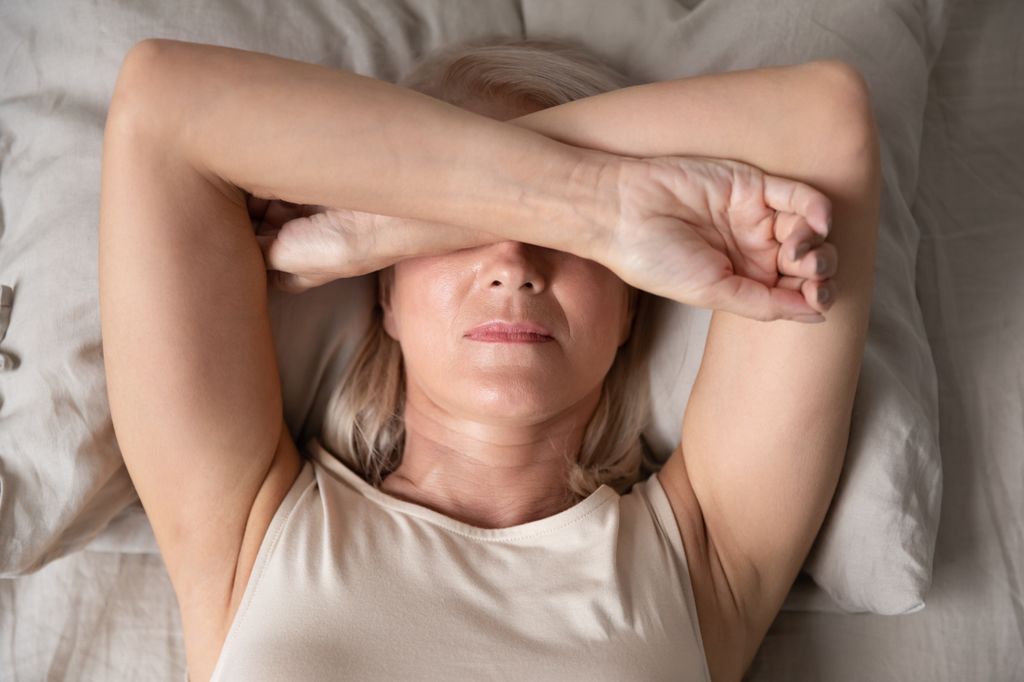As the biggest and brightest full moon of the year, the Hunter's Moon, prepares to light up the sky on October 17th, it's not just stargazers taking note. Women going through menopause are also increasingly aware of the lunar cycle’s potential impact on their hormonal health.
With searches for "full moon October + menopause" spiking by 303% this past week alone and over 24 million posts on TikTok under "full moon effect on women," the influence of the moon is a hot topic.
To help understand how the supermoon might affect hormonal balance during menopause, HELLO! spoke to Mike Kocsis, a hormonal health expert at Balance My Hormones.
The Supermoon Effect on Menopausal Symptoms
According to Mike, the moon’s orbit around Earth is elliptical, which means there are times when the moon is closer to us than usual. "When a full moon coincides with the moon being at its closest point to Earth, it's called a supermoon," he explains. "This makes the moon appear 15% larger and 30% brighter than a regular full moon, which can have a stronger gravitational pull and impact on natural rhythms—including hormonal cycles."
For women going through menopause, these natural rhythms are already disrupted by fluctuating hormones, and the extra brightness and pull of the supermoon can make those fluctuations even more intense.
Melatonin and Sleep Disruption
One of the key hormones that gets affected by the supermoon is melatonin, often referred to as the "sleep hormone." Melatonin is released in response to darkness, signaling our bodies that it’s time to sleep. However, Mike notes, "With the increased brightness of the supermoon, even if you're indoors, your brain may perceive that it's still daylight, which can reduce melatonin production and disrupt sleep."
"Women in menopause often struggle with sleep disturbances already, due to night sweats and hot flushes," Mike adds. "The supermoon can intensify this by making it harder to fall asleep or stay asleep."
The Cortisol Connection
Disrupted sleep doesn’t just affect your energy levels; it can also increase cortisol levels, which is often called the "stress hormone." "When we don’t get enough restorative sleep, cortisol levels remain elevated, making us more prone to stress, anxiety, and emotional instability," Mike tells us. "Many women report feeling more emotionally sensitive during a full moon, and for those in menopause, this sensitivity can manifest as mood swings or heightened anxiety."
Oestrogen, Progesterone, and Emotional Sensitivity
Fluctuating levels of oestrogen and progesterone during menopause are responsible for some of the most well-known symptoms, including mood swings and hot flushes. While there’s no direct link between the supermoon and these hormones, the moon’s influence on emotional wellbeing and sleep can exacerbate these symptoms.
"Oestrogen helps regulate mood and sleep, while progesterone promotes relaxation," Mike explains. "When these hormones are already low, the added stress from poor sleep or emotional fluctuations can make menopause symptoms feel more intense during a supermoon."
How to Manage Hormonal Changes During the Supermoon
1. Create a Sleep-Friendly Environment
"The brightness of the supermoon can easily disrupt your sleep patterns, especially if your hormones are already out of balance," Mike advises. "Make sure you have a good wind-down routine—avoid screens for at least an hour before bed, use blackout curtains, or wear a sleep mask to block out the extra light."
2. Manage Stress with Mindfulness
"Menopause often brings heightened emotional sensitivity, which can be exacerbated by elevated cortisol during the full moon. Activities like deep breathing exercises, meditation, or yoga can help lower stress and improve emotional stability," Mike says. "Taking time for mindfulness can reduce cortisol levels and improve your sleep quality."
3. Track Your Symptoms
Keeping track of your symptoms during different phases of the moon can offer valuable insights. "If you notice that your hot flushes or mood swings are worse during a full moon, you can anticipate what your body might need during these times," Mike suggests. "This helps you stay one step ahead and adjust your routine accordingly."
4. Stay Hydrated
"Staying hydrated is always important, but even more so during menopause and lunar events. Drinking enough water helps regulate body temperature and can ease the intensity of hot flushes and night sweats," Mike explains. "It also supports brain function, making it easier to manage any emotional swings triggered by the full moon."
5. Embrace the Energy
While some may feel the supermoon heightens their menopause symptoms, Mike offers a refreshing perspective: "It’s not all bad! Many women report feeling more attuned to their bodies during a full moon. The supermoon can bring increased energy, which you can channel into self-care, whether that’s rest, reflection, or simply embracing the natural rhythms of your body."
Finding Balance in the Lunar Cycle
As we prepare for the Hunter’s Moon, it’s clear that the relationship between the lunar cycle and our bodies, particularly for those navigating menopause, is complex. While the supermoon may bring challenges, it also offers an opportunity to listen more closely to your body and embrace the natural rhythm of life.
"For women going through menopause, it’s about finding balance," Mike concludes. "Whether it’s adjusting your sleep environment, managing stress, or simply tuning into your body’s needs, there are ways to navigate this hormonal journey with grace—even under the bright light of a supermoon."


